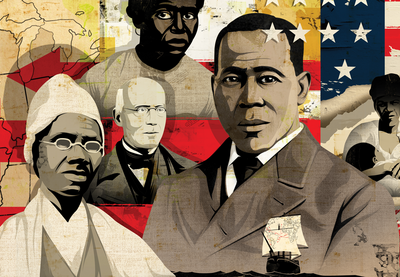Coming Soon
Andrés Reséndez is the author of The Other Slavery: The Uncovered Story of Indian Enslavement in America. His work has changed conventional wisdom about the institution of slavery in the Atlantic World. Over the next two episodes, host Hasan Kwame Jeffries and Reséndez will discuss key turning points in this history—exploring how it expands our understanding of the transatlantic slave trade and the lasting legacy of colonialism, which continues to reverberate in our communities. Be sure to join us.
Subscribe for automatic downloads using:
Apple Podcasts | Google Music | Spotify | RSS | Help
Transcript
Hasan Kwame Jeffries: “In 1492, Columbus sailed the ocean blue…” He did it again in 1493. But when he returned, he brought slavery with him—introducing distinctly European practices of human bondage. He captured hundreds of people and carried them back to Spain and sold the survivors into slavery. They were the first of millions of Indigenous peoples enslaved by European invaders, settlers and their descendants over the next four centuries in the Americas.
Andrés Reséndez is the author of The Other Slavery: The Uncovered Story of Indian Enslavement in America. His work has changed conventional wisdom about the institution of slavery in the Atlantic World.
Andrés Reséndez: I think this is a key missing piece of the history of the Americas. But only now are we beginning to put it all together in a more comprehensive understanding of the scope of this phenomenon, of the importance of this phenomenon.
Hasan Kwame Jeffries: Over the next two episodes, I’m going to speak with Dr. Reséndez. We will discuss key turning points in this history and explore how Indigenous enslavement expands our understanding of the transatlantic slave trade and slavery itself.
Andrés Reséndez: Two-point-five [million] to 5 million human beings from Columbus to 1900 that took place in the entirety of the continent. Not a single region was spared from this scourge. The Spanish did it. The Portuguese did it. The English did it. The Dutch did it. The French did it. The Mexicans did it. The Americans did it. And eventually, various Indigenous groups became part of the system. It involved everybody who was a colonizer.
Hasan Kwame Jeffries: We’ll look beyond the British colonies to examine colonialism across the Americas and talk about why emancipation took so long to complete. And we will discuss the lasting legacy of colonialism, which continues to reverberate in our communities.
Andrés Reséndez: It really should open your eyes about the geographic scope, about the involvement of the actors and about the continuities all the way until today. We are finally coming to grip with a vast phenomenon involving millions of human beings that had been obscured before. And that is a very dynamic system that was able to operate in covert and clandestine ways. It never really went away, and it continued well past the formal abolition and the passing of the 13th and 14th Amendments.
Hasan Kwame Jeffries: I’m really excited to share this conversation with you, so stay tuned. I’m Dr. Hasan Kwame Jeffries, associate professor of history at The Ohio State University and your host for Teaching Hard History: American Slavery.
